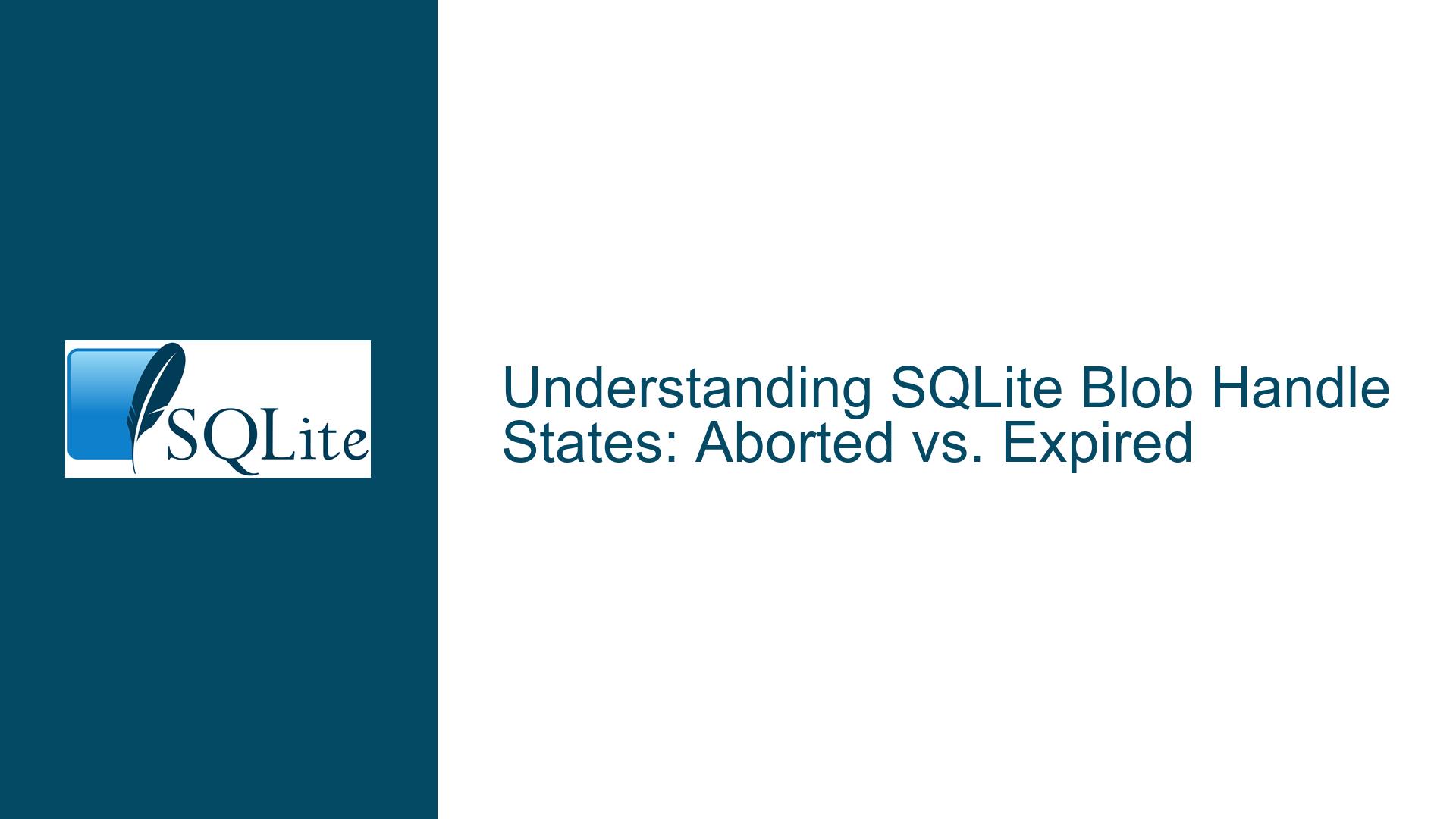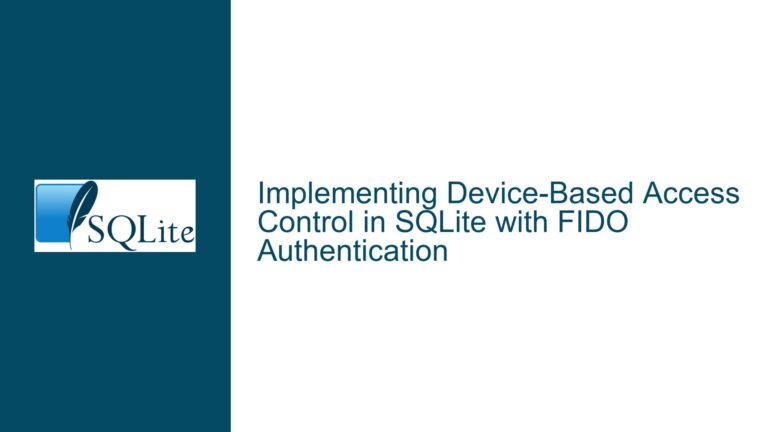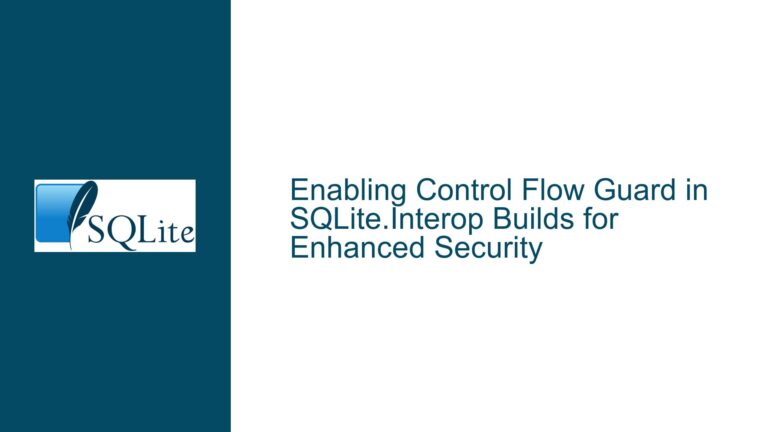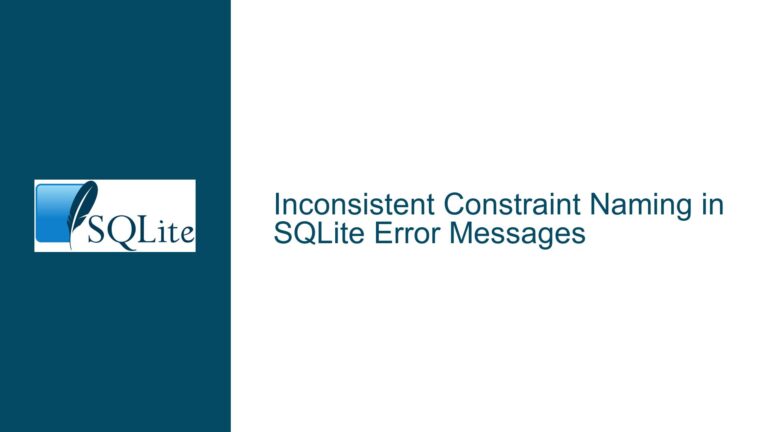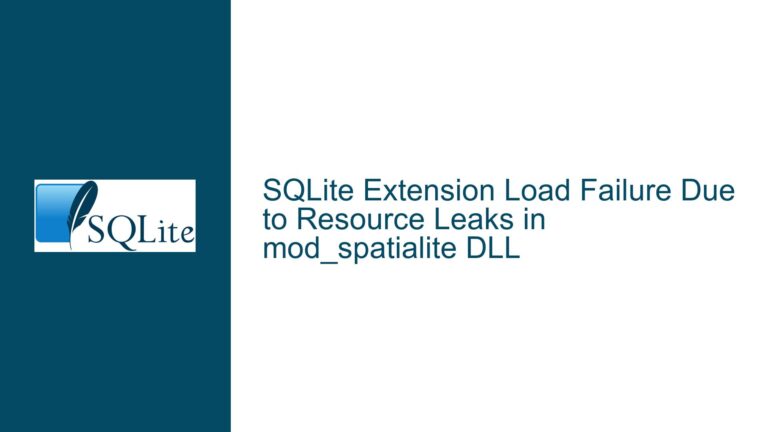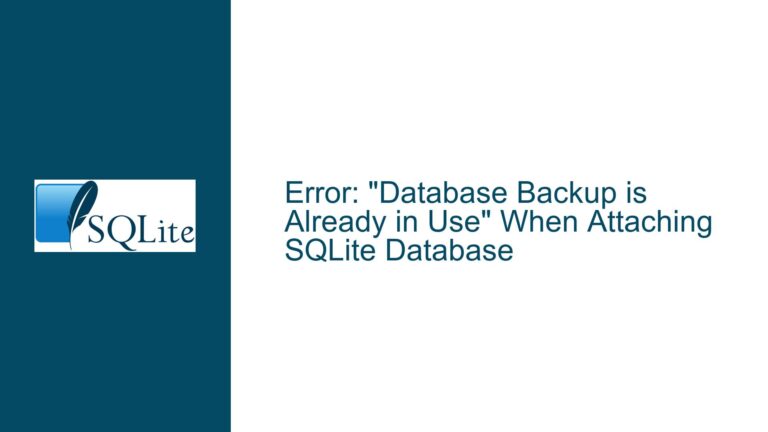SQLite Blob Handle States: Aborted vs. Expired
Issue Overview: Clarifying the "Aborted" and "Expired" States in SQLite Blob Handles
In SQLite, the handling of Binary Large Objects (BLOBs) is a critical aspect of database operations, particularly when dealing with large data objects such as images, documents, or other multimedia content. The SQLite C API provides several functions to interact with BLOBs, including sqlite3_blob_read, sqlite3_blob_write, and sqlite3_blob_reopen. These functions allow developers to read from, write to, and reposition within BLOB data efficiently. However, the documentation and implementation details surrounding the states of BLOB handles, specifically the "aborted" and "expired" states, can be a source of confusion.
The "aborted" state is explicitly mentioned in the documentation for the sqlite3_blob_reopen function, while the "expired" state is referenced in the context of several other sqlite3_blob_* functions. The core issue revolves around whether these two states are synonymous or if they represent distinct conditions within the lifecycle of a BLOB handle. Understanding the nuances between these states is crucial for developers who need to handle BLOB data reliably, especially in scenarios where BLOB handles may become invalid due to various runtime conditions.
The confusion arises from the fact that both states seem to describe situations where a BLOB handle is no longer valid. However, the documentation does not explicitly state whether "aborted" and "expired" are interchangeable terms or if they describe different failure modes. This ambiguity can lead to misinterpretation of error conditions and, consequently, improper error handling in applications that rely on SQLite’s BLOB handling capabilities.
To delve deeper into this issue, it is essential to examine the source code and documentation closely. The provided code snippets from vdbeblob.c reveal that both the sqlite3_blob_read and sqlite3_blob_reopen functions return SQLITE_ABORT when the BLOB handle is invalidated. This suggests that the "aborted" state is a specific condition where the BLOB handle has been invalidated, typically due to the absence of a statement handle (p->pStmt == 0). However, the term "expired" is not explicitly used in the code, which raises questions about its relationship to the "aborted" state.
Possible Causes: Why "Aborted" and "Expired" States Might Differ or Overlap
The distinction or overlap between the "aborted" and "expired" states in SQLite BLOB handles can be attributed to several factors, including the lifecycle of BLOB handles, the conditions under which they become invalid, and the specific error codes returned by the SQLite API. Understanding these factors is key to resolving the confusion surrounding these states.
One possible cause of the ambiguity is that the terms "aborted" and "expired" might be used in different contexts within the SQLite documentation. The "aborted" state is explicitly tied to the sqlite3_blob_reopen function, where it describes a situation where the BLOB handle has been invalidated due to the absence of a statement handle. On the other hand, the "expired" state might be a more general term used to describe any situation where a BLOB handle is no longer valid, regardless of the specific cause.
Another possibility is that the "expired" state is a superset of the "aborted" state. In this scenario, a BLOB handle could be considered "expired" for various reasons, such as the underlying database connection being closed, the BLOB data being deleted or modified, or the BLOB handle being explicitly closed by the application. The "aborted" state, in contrast, might specifically refer to cases where the BLOB handle is invalidated due to the absence of a statement handle, which is a subset of the broader "expired" condition.
The source code snippets provided in the discussion further support the idea that the "aborted" state is a specific condition within the broader category of "expired" states. In both sqlite3_blob_read and sqlite3_blob_reopen, the SQLITE_ABORT error code is returned when the BLOB handle is invalidated due to the absence of a statement handle. This suggests that the "aborted" state is a specific instance of an "expired" BLOB handle, where the invalidation is directly tied to the statement handle.
However, it is also possible that the "expired" state is used in the documentation to describe other conditions that lead to BLOB handle invalidation, such as changes to the underlying database schema or the deletion of the BLOB data. In such cases, the BLOB handle might be considered "expired" even if the statement handle is still present. This would imply that the "expired" state is a broader concept that encompasses multiple failure modes, including but not limited to the "aborted" state.
Troubleshooting Steps, Solutions & Fixes: Resolving Ambiguities and Handling BLOB Handle States Effectively
To address the ambiguity between the "aborted" and "expired" states in SQLite BLOB handles, developers can take several steps to ensure that their applications handle these states correctly. These steps involve a combination of code analysis, documentation review, and practical testing to verify the behavior of BLOB handles under different conditions.
First, developers should carefully review the SQLite documentation to understand the context in which the terms "aborted" and "expired" are used. While the documentation for sqlite3_blob_reopen explicitly mentions the "aborted" state, the term "expired" might be used in a more general sense across various sqlite3_blob_* functions. By cross-referencing the documentation for these functions, developers can gain a clearer understanding of how these terms are intended to be used.
Next, developers should examine the source code of SQLite, particularly the vdbeblob.c file, to see how the SQLITE_ABORT error code is used in different contexts. The provided code snippets show that SQLITE_ABORT is returned when the BLOB handle is invalidated due to the absence of a statement handle. This suggests that the "aborted" state is a specific condition within the broader category of "expired" states. By analyzing the source code, developers can confirm whether the "expired" state is used to describe other conditions that lead to BLOB handle invalidation.
Once the relationship between the "aborted" and "expired" states is understood, developers should implement appropriate error handling in their applications. This involves checking for the SQLITE_ABORT error code when calling sqlite3_blob_read, sqlite3_blob_write, and sqlite3_blob_reopen, and taking appropriate action when the BLOB handle is invalidated. For example, if a BLOB handle is invalidated due to the absence of a statement handle, the application might need to reopen the BLOB handle or recreate the statement handle before proceeding.
In addition to handling the "aborted" state, developers should also be prepared to handle other conditions that might cause a BLOB handle to become "expired." This includes scenarios where the underlying database connection is closed, the BLOB data is deleted or modified, or the BLOB handle is explicitly closed by the application. In such cases, the application might need to reopen the BLOB handle, re-establish the database connection, or handle the error in a way that is appropriate for the specific use case.
To ensure that their applications handle BLOB handle states correctly, developers should also conduct thorough testing under various conditions. This includes testing scenarios where the BLOB handle is invalidated due to the absence of a statement handle, as well as scenarios where the BLOB handle becomes "expired" due to other reasons. By testing these scenarios, developers can verify that their applications handle BLOB handle states correctly and take appropriate action when errors occur.
Finally, developers should consider contributing to the SQLite documentation to clarify the relationship between the "aborted" and "expired" states. By providing clear and consistent definitions of these terms, the SQLite documentation can help prevent confusion and ensure that developers have the information they need to handle BLOB handle states effectively. This might involve submitting a patch to the SQLite documentation or raising an issue on the SQLite bug tracker to request clarification.
In conclusion, the distinction or overlap between the "aborted" and "expired" states in SQLite BLOB handles is a nuanced issue that requires careful analysis of the documentation and source code. By understanding the conditions under which these states occur and implementing appropriate error handling, developers can ensure that their applications handle BLOB data reliably and efficiently. Additionally, contributing to the SQLite documentation can help clarify these terms for future developers, reducing the likelihood of confusion and improving the overall quality of SQLite-based applications.
